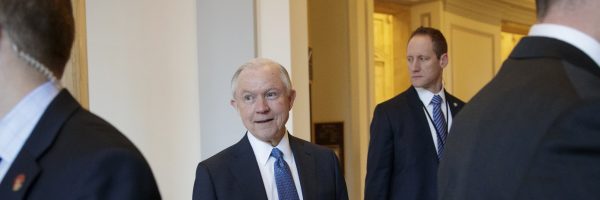Jeff Sessions Learns Lessons from Notre Dame, and More – Chicago News

Let’s explore some of the most interesting stories that have emerged from Chicago business schools this week.
Stop Flailing and Start Delivering – Kellogg Insights
Of the “five common issues that impede career progress” Northwestern Kellogg clinical professor of innovation and entrepreneurship Carter Cast writes about in his new book, The Right (and Wrong) Stuff: How Brilliant Careers Are Made—and Unmade, the one issue that people most frequently self-identify is struggling to keep up.
Cast writes, “Careers can derail when people don’t deliver on promises. This can be a real problem because fellow workers start to distance themselves when they think you can’t be counted on.”
Cast offers five suggestions for how to “get organized and get ahead.”
1) Be Clear on What’s Expected of You
“Being clear with your boss on what success looks like is really important for setting expectations and ensuring you’re aligned. What are your goals and objectives for the year? What are the key initiatives that map to those objectives? What are the timelines for those initiatives, and what sort of resources will you need?”
2) Understand Your Organization’s Workflow Process
Cast says creative types tend to “overpromise and underdeliver” because “their eyes are typically bigger than their stomachs.” To these folks, Cast says, “Decide which tasks will really move the needle for your organization, and focus on those first. You can’t treat every message in your inbox equally.”
3) Be Intentional about Prioritizing Your Work
Cast suggests “breaking your day into segments and tackling challenging work during times when you are sharpest and most productive.” For instance, if your brain is most active between six and ten in the morning, for instance, that may not be the best time to respond to noncritical emails.”
YOU MAY ALSO LIKE: Kellogg Admissions Director Shares Insights on 2019 MBA Application
4) Learn How to Say “No”
Cast writes that people-pleasers “tend to take on more than they should—their default response is, “yes, why not?” But learning when to say “no,” and learning to do it tactfully, is critical for preserving valuable time and energy.”
5) Look for Opportunities to Delegate
Cast says, “We tend to think the best person to perform a given task is ourselves. In many cases, you have to learn to let go a bit. Things won’t go exactly the way you’d like, but you have to move forward and avoid needless distractions.”
You can check out the full article here.
Larry Gies Urges 2018 Graduates to “Find Your Way” – Gies School of Business Blog
Madison Industries founder, president, and CEO Larry Gies used his speech at Gies’ recent Convocation ceremony, which honored the “1,824 bachelor’s, master’s, and doctoral degree recipients,” as an opportunity to inspire graduates to spend time pinpointing their passion for what they do—or their “why.”
Gies, who donated $150 million to the University of Illinois last year, thus, changing the name of the business school in his honor, explains, “Knowing your why is critical. It is the ability to connect the dots between what you’re doing each and every day and a higher purpose. Our why is what drives us, inspires others around us, and allows us to persevere during those difficult moments. To put it simply, when you find your why, you love what you do.”
Gies adds, “I was forty-five before I found my why.”
Find out more about Gies’ speech here.
I’m a Biblical Scholar. It’s Clear That Jeff Sessions Needs a Bible Lesson – Mendoza Ideas & News
Notre Dame Mendoza business ethics professor and former Jesuit priest Joseph Holt contributed an op-ed to a recent issue of Fortune in which he took Attorney General Jeff Sessions to task for his “use of scripture to defend the Trump administration’s immigration policies.”
Professor Holt writes, “Sessions is pursuing justice understood as the strict and impartial application of the law. That shriveled understanding of justice is captured in the statement by Homeland Security Secretary Kirstjen Nielsen: ‘In the United States, if you break the law, you go to jail and you’re separated from your family.’
He adds, “From that viewpoint justice and mercy are opposed, because mercy could impede the administration of strict justice. But tzedek [the Hebrew word for “justice”] and its derivative tzedakah (which is a commandment to give as an act of social justice), mean justice and mercy working in unison.”
You can read the full article here.
Empathy and Power, According to Northwestern Research – Chicago News

Let’s explore some of the most interesting stories that have emerged from Chicago business schools this week.
How Much Empathy Do You Feel When Powerful People Suffer? – Kellogg Insight
Northwestern Kellogg assistant professor of management and organizations Nour Kteily recently co-authored new research with Cornell University assistant professor Brian Lucas that explores how much empathy people experience when the factory floor worker suffers a pay cut compared to when the executive’s six-figure salary gets lobbed off.
Kteily writes, “The prevailing view has been that anti-egalitarians do not have it in them to empathize, and egalitarians are empathetic toward everyone.
Kteily’s research found that “when people read about victims with lower social status, egalitarians consistently expressed more empathy than people with anti-egalitarian views did. But when they read about victims with a higher socioeconomic standing, the opposite occurred. Participants who strongly favored a social hierarchy expressed more concern for victims like the wealthy executive than the egalitarians did.”
You can read the full article here.
Friend or Foe? Notre Dame Conference Explores Ethical Considerations of AI – Mendoza Ideas & News
Notre Dame University’s Mendoza College of Business recently announced “Artificial Intelligence and Business Ethics: Friends or Foes,” a fall 2018 conference sponsored by the Chase Manhattan Lecture Series, that “will explore the ethical issues arising from the use of AI in business and larger culture.”
Associate teaching professor in Mendoza’s IT, Analytics, and Operations Department Timothy Carone, who organized the conference, writes:
“The reason AI is so important is that it can make and implement decisions that heretofore were the purview of humans only. Over time, these decisions set up a pattern and it is this pattern we call ‘ethical behavior.’ We have only begun to explore the ethical implications to businesses of using AI to replace human decision-making and understand how to manage the new risks that come with this transformation.”
Featured speakers include:
- Daniel Fagella, the founder of daily newsletter TechEmergence, which serves as an industry source for business applications of AI.
- Martin Fiore, EY Americas Tax Talent leader who has explored the implications of AI in the tax, audit and talent acquisition areas.
- Otto Berkes, the chief technology officer for CA Technologies, one of the largest independent system software companies in the world.
- Ryan Welsh, founder and CEO of Kyndi, a venture-backed software company that is changing the paradigm of machine intelligence and how it’s used to solve some of the world’s hardest problems.
You can read the full article from Mendoza here.
Alan Dershowitz Shares His View on Key Legal and Ethical Issues – Gies College of Business News
High-profile lawyer and frequent contributor on FOX News and CNN, Alan Dershowitz, whose distinguished career in law has encompassed high-profile celebrity clients like Mike Tyson, Patty Hearst, and O.J. Simpson, visited the University of Illinois this past April.

Controversial lawyer and political personality Alan Dershowitz recently spoke at the University of Illinois / Photo via NYT
Dershowitz used his lecture as an opportunity to “discuss and to answer questions about freedom of speech, professional ethics, attorney-client privilege, and a range of other topics,” such as “media issues, attorney-client privilege, conflict of interest, and comparative ethics” with students from the Gies College of Business and the U-IL College of Law.
“Ethics are very situational. As lawyers, we’ve all be told things by our clients that we can’t sleep at night keeping as secrets. You feel you have to tell somebody. And you can’t. I can’t tell my wife or my children. You go to the grave with these secrets. And if you don’t want to do that, you can’t become a very good lawyer.”
You can read the full article here.
MBAs Hold High Expectations for B-School Admissions Process, Survey Finds

According to the 2018 MBA Applicant Survey conducted by the Association of International Graduate Admissions Consultants (AIGAC), MBA applicants expect a lot from business schools as they make their way through the admissions process. Not only do they want the schools themselves to be more transparent—including providing status updates, feedback, and earlier wait list decisions—they also want more consultant advice and interaction.
“More transparency in terms of the status of the application will be appreciated,” wrote one survey respondent. “Leading schools like [schools] were notoriously quiet about the application for more than 5 weeks.”
Even applicants whose bids for admission were unsuccessful want more from schools. “Feedback at some point would be fantastic,” wrote one. “At least some indication of what portion of an application was below expectation would be helpful even just for personal development.”
The latest annual AIGAC survey drew almost 2,000 responses from applicants to more than two dozen leading business schools. Results were released as part of the admissions consultant group’s annual conference, which took place last week at Northwestern’s Kellogg School of Management.
Where Do MBA Applicants Look for Admissions Information?
According to the survey results, school websites are a primary source of information for 80 percent of applicants. After school websites, online information sessions, student and alumni referrals, and admissions teams are where applicants are most likely to turn. In terms of what they are looking for, applicants are most eager for information that helps them set expectations for the admissions process, but finding it isn’t always easy. As one survey respondent said, “[School]’s application process was steeped in mystery.”
Outside of school resources, students look to social media, online communities/forums, MBA rankings, and then family/friends/work colleagues. They also look to the blogs and websites of admissions consultants as well as printed viewbooks and brochures. And many applicants look in as many places as possible to find the information they crave.
“Videos, interviews, and current or alumni experiences are very valuable,” wrote one survey respondent. Another underscored the importance of school websites being “very easy to navigate.” Online seminars that only reiterate information available on the schools’ websites are less valuable, shared another.

In the social media sphere, more applicants look to LinkedIn for information than any other channel, followed by YouTube and Facebook. Quora follows, trailed by Instagram and Twitter.

Schools That Get to Know MBA Applicants Best
Cornell’s Johnson Graduate School of Management, UVA’s Darden School of Business, and Dartmouth’s Tuck School scored the highest marks in terms of how well they get to know applicants as part of the admissions process. Notably, some of the most highly ranked business schools fell short in this regard, with Stanford Graduate School of Business and Harvard Business School bringing up the rear. As one candidate explained, “Though I fell in love with [school] during my campus visit, I felt that their application process was very impersonal, and I didn’t feel like I had enough of an opportunity to show the school who I was with a video and a [short essay] …”

Why the MBA? Why a Particular School?
The survey also sought to understand what most motivates applicants to apply to MBA programs in general. More than half—57 percent—seek to acquire new information, skills, and knowledge. Forty-nine percent, meanwhile, want access to job prospects. And 48 percent are seeking a stronger network or to advance their careers.
As for the top factors influencing which schools applicants choose to target, reputation reigns supreme, cited by 66 percent of applicants surveyed. School rank was a top factor for 61 percent, and school culture, for 53 percent.
To learn more about the survey results and to read more personal responses from applicants, consult the full survey here.
This article was edited and published with permissions from our sister site, Clear Admit.
What are the Best MBA Programs by Specialty?

Each year, U.S. News and World Report looks at the top business schools around the country to decide which offer the best MBA programs. The goal is to help MBA candidates most effectively choose the best MBA degree to help them achieve their goals based on their interests and strengths. The problem is that there are hundreds of programs and it can be difficult to weed out all the noise to get to the information that you want most.
That’s why the U.S. News and World Report decided to break down all of their findings into a more easily consumable ranking. They outlined the top MBA programs by discipline to help you quickly and easily find the school you’re looking for. Each of the schools on the list was chosen based on alumni interviews, schools statistics, research data, and more.
We’ve broken down the results below along with crucial information about each school listed and where you can learn more information.
Kellogg Admissions Director Shares Insights on 2019 MBA Application

Northwestern University’s Kellogg School of Management is one of several leading business schools to release its 2019-2020 MBA application online within the last week. At Kellogg, deadlines for the upcoming admission season are as follow:
- September 19, 2018
- January 9, 2019
- April 10, 2019
To help you get started, Director of Admissions Melissa Rapp provided insight into the 2019 MBA application along with some great advice on how to prepare. We’ve shared some of the most pertinent details below.
Written Essay Questions Remain Unchanged
The Kellogg written essay questions remain the same this year as last. Applicants will need to answer the following two questions.

- Tell us about a time you have demonstrated leadership and created lasting value.
To answer this question, MBA applicants should think about a specific challenge they have faced in their career and how they overcame it. Specifically, Rapp advises applicants to think about their contribution to their organization and the lasting value they created.
- How have you grown in the past? How do you intend to grow at Kellogg?
This question is about looking at both past performance and future behavior. Remember to keep in mind the reason why you’re pursuing an MBA in your answer.
Video Essay Advice
For four years, MBA applicants have been expected to complete a video essay, and this interview season is no different. Rapp recommends using your video essay as your chance to tell your story in your voice. In the video portion, you’ll answer three questions:
- What path are you interested in pursuing? How will you get there?
- Why is this program right for you?
- Randomly generated question about overcoming obstacles.
When answering these questions, Rapp encourages applicants to speak from the heart and to avoid repeating phrases from their written essay. You’ll have a few practice questions to help you get comfortable; then, they’ll dive straight into the official questions. Think of the video portion like an interview more than an essay.
As for the technology, the Kellogg technical team is available 24/7 with questions or concerns, though Rapp says few if any candidates struggle.
Focus on Your Unique Qualities
In this most recent blog post, Rapp also underscored Kellogg’s focus on diversity and inclusion. Specifically, she explained that the school is interested in a broad range of backgrounds, experiences, perspectives, and opinions. So, be confident in telling your story and what makes you unique. That’s what the admissions team wants to hear all about.
To read the full article and learn more about the 2019 MBA application, visit the Kellogg website.
This article has been edited and republished with permissions from our sister site, Clear Admit.
Northwestern Investing in Green Companies, and More – Chicago News

Let’s explore some of the most interesting stories that have emerged from Chicago business schools this week.
The Case for Investing in Green Companies – Kellogg Insight
Northwestern University Kellogg School of Management professor of finance Ravi Jagannathan recently co-authored a new paper, which found that the more companies adopted greener practices, as defined by environmental, social, and governance (ESG) criteria, the more adaptable they are to changes in environmental regulations and the higher likelihood their share prices could increase.
Jagannathan and his co-authors stressed the importance of environmental risk, “particularly in the age of social media.”
He adds, “Today’s consumers can communicate and mobilize much faster—for instance, to shame a company for its unsustainable practices. Social media has made it easy to identify violators. If you invest in companies with shady environmental practices, you may be caught by surprise.”
He also adds, “Companies that pollute more now will be adversely affected by more stringent environmental laws coming into play and by alternative technologies spurred by environmental concerns.”
“What is standing in the way of coal is not regulation. You need to worry about alternative technologies catching up in response to consumers’ concerns.”
Jagannathan advises companies to “prepare for ESG-related changes [or they] will lose out in the long run.”
Read more about Jagannathan and his team’s research here.
Is There an Expert in the House? – Chicago Booth News
Three University of Chicago Booth School of Business entrepreneurs recently participated in a lunchtime panel, “The Cross-Disciplinary Formula for a Successful Venture,” held at the Harper Center in Hyde Park as part of the Polsky Center for Entrepreneurship and Innovation’s Innovation Fest.
The panelists discussed the impact that Booth community resources had on their startups and use the talk as an opportunity to offer advice to aspiring entrepreneurs on financing, product development, marketing, and personal growth.
ExplORer Surgical CEO and co-founder Jennifer Fried, MBA ’15 whose startup functions as a “a new digital playbook for operating personnel,” wrote about the “many cross disciplinary programs [it] took advantage of,” including the Polsky Center and the UChicago Startup Investment program.
Ascent Technologies co-founder Brian Clark, MBA ’17, whose firm “helps companies build and manage regulation compliance programs,” characterized this “sense of collectivism and community, [which] allows new ventures to thrive and grow.”
Tovala co-founder David Rabie, MBA, ’15, whose food technology company “pairs a steam-based oven with a meal-kit subscription service,” unpacked the challenges of bringing a new product to market.
“We’re trying to fundamentally change the way people think about eating at home. We have customers as young as 20 and as old as 85, but our real target is young families. It’s a massive market and we’re still trying to figure out the best way to reach these customers. We haven’t cracked that nut yet.”
Glean more insights from Chicago Booth entrepreneurs here.
Business and the Cycle of Nature – Quinlan School of Business Blog
Loyola Quinlan professor of sustainable business management Nancy E. Landrum, Ph.D., recently wrote an article for the Quinlan blog that “outlines how businesses can learn from nature’s 3.8 billion years of survival.”
She writes:
“Businesses generally use resources in a more linear fashion: we take resources from nature—water, plants, animals, minerals—and we transform them into products to sell. The products are then used and discarded. This has led to a depletion of resources and an abundance of waste.”
“But it can be quite simple if approached from the lessons of the cycles of nature: renewable, without waste, and conducive to life. If every company’s actions followed these simple guidelines learned from nature’s 3.8 billion years of survival, then it becomes clear that the company is creating conditions for its own survival.”
Read Dr. Landrum’s entire article here.
